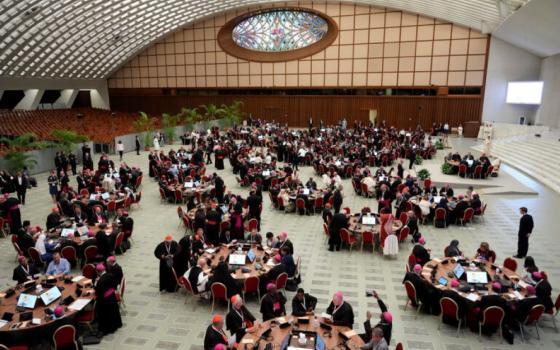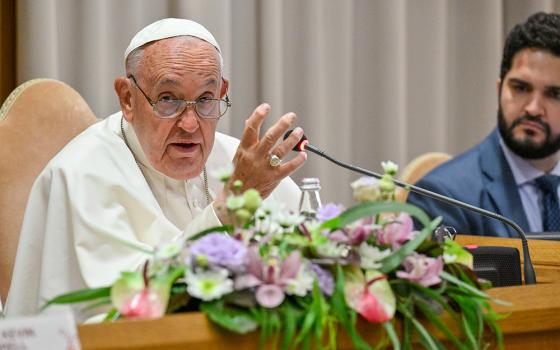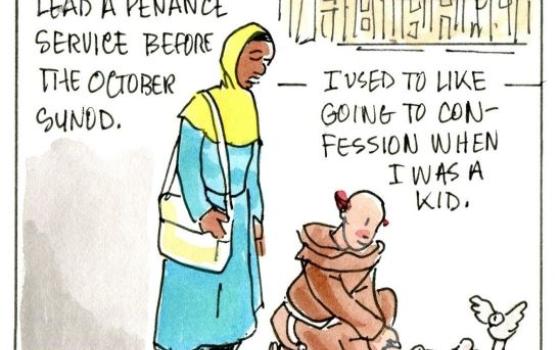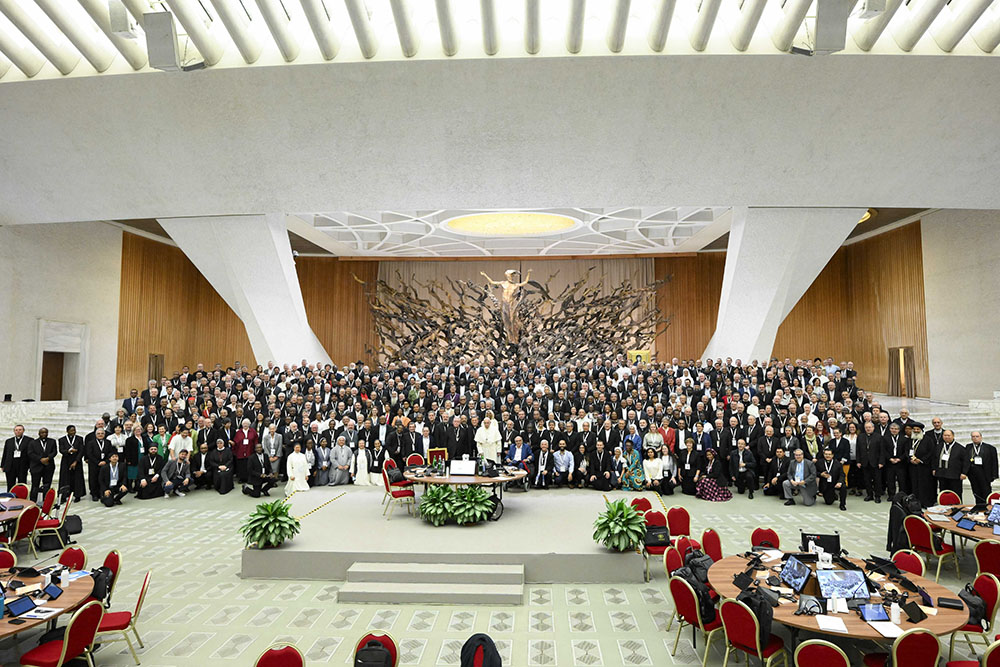
Pope Francis poses for a photo with participants in the assembly of the Synod of Bishops before a working session in the Paul VI Audience Hall at the Vatican Oct 23. (CNS/Vatican Media)
As Pope Francis' monthlong Vatican summit on the future of Catholicism nears its conclusion, delegates highlighted the significance of women receiving the full right to vote for the first time ever at such an event, and the duty of the church to listen to clergy abuse victims as it seeks to reform.
"For the first time, at Pope Francis' invitation, men and women have been invited, in virtue of their baptism, to sit at the same table to take part, not only in the discussions, but also in the voting process of this Assembly of the Synod of Bishops," read a two-and-a half page letter published on Oct. 25.
The letter is addressed to the "people of God" and was approved by the some 450 delegates from around the world participating in the Oct. 4-29 Synod of Bishops at the Vatican. For the first time in its history, the gathering included the participation of about 54 women as full, voting members.
The brief Oct. 25 letter is separate from the assembly's final document, which is expected to be voted on and released Oct. 28.
Although procedural voting has taken place at several points throughout the Vatican summit, the Oct. 28 vote on the final text has been a focus. Vatican officials said on Oct. 25 that the upcoming document will likely outline the assembly's areas of agreement and disagreement, and identify issues that need further study or consideration.
Throughout the month, synod delegates have considered a range of hotly debated topics, including the role of women's ministries in the church, the impact of clergy sex abuse and better participation of LGBTQ Catholics.
Advertisement
The Oct. 25 letter — first announced by synod organizers on Oct. 19 — is intended to communicate the experience of the Vatican synod meeting to Catholics around the world. In two years of run-up to the event, millions of Catholics participated in diocesan, national and continental consultation sessions.
As delegates return home to their dioceses and the church prepares for the second session of the synod in Rome in October 2024, the letter states that the church "absolutely needs to listen to everyone, starting with the poorest."
While the text provides special mention of Indigenous persons and victims of racism — and notes that the synod has taken place against the backdrop of a "world in crisis" — the letter places a top priority on responding to victims of clergy sexual abuse.
"Above all, the Church of our time has the duty to listen, in a spirit of conversion, to those who have been victims of abuse committed by members of the ecclesial body, and to commit herself concretely and structurally to ensuring that this does not happen again," it states.
The brief letter was first reviewed by synod members Oct. 23. The Vatican said the text had initially been approved by acclamation in the synod hall that day, but was then opened to amendments from the synod members. The assembly approved the final text via a vote on Oct. 25.
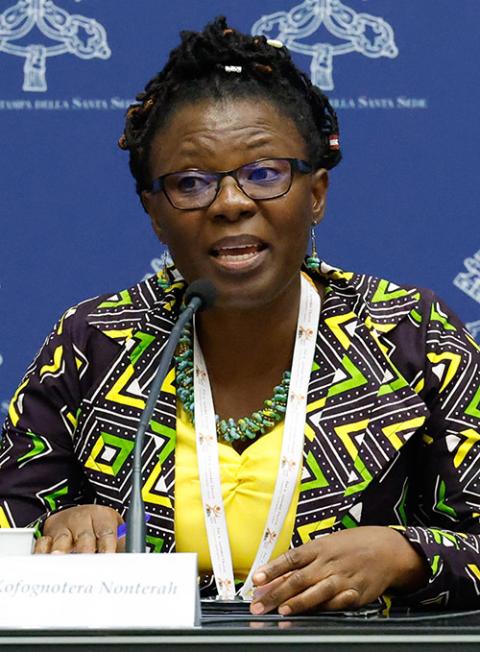
Nora Kofognotera Nonterah, a Ghanaian theologian and synod voting member, speaks during a briefing at the Vatican Oct. 25. (CNS/Lola Gomez)
The letter recalls various moments of the synodal experience, including a Sept. 30 ecumenical prayer vigil at the Vatican; the Oct. 4 release of an apostolic exhortation by the pope on the environment, Laudate Deum; and a lunch between the pope and members of the economically impoverished community around the Vatican, who reportedly told Francis that their chief expectation from the synod was "love."
Synodality, the letter continues, is about "seeking to discern what the Holy Spirit wants to say to the Church today. ... This is not about ideology, but an experience rooted in the apostolic tradition."
"We do not need to be afraid to respond to this call," it concludes.
At a press briefing earlier on Oct. 25, several synod members praised the assembly's new method for discussing difficult issues, with participants seated around roundtables and primarily having small-group discussions.
Cardinal Robert Prevost, who heads the Vatican's Dicastery for Bishops, said the conversations at the synod had involved "learning to listen to everyone, [and] learning to dialogue with trust."
Prevost, an American who had previously served as a bishop in Peru, said it had been "a very positive experience."
"Difficulties arise, as they do in every human experience," he said.
Asked about how the synod had considered the clergy abuse crisis, Prevost said the protection of minors in the church had been discussed at the tables but was not "the central topic" of the assembly.
"The whole life of the church does not revolve around that specific issue, as important as it is," he said.
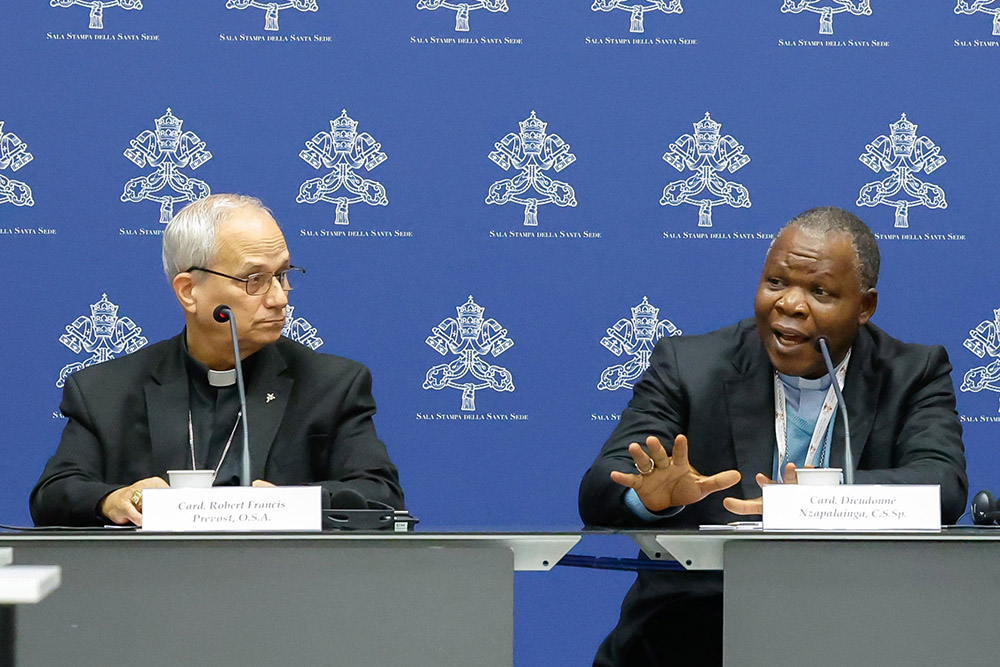
Cardinal Dieudonné Nzapalainga of Bangui, Central African Republic, speaks during a briefing about the assembly of the Synod of Bishops as Cardinal Robert Prevost, prefect of the Dicastery for Bishops, listens at the Vatican Oct. 25. (CNS/Lola Gomez)
Cardinal Dieudonné Nzapalainga, the archbishop of Bangui, Central African Republic, said the synod had been a time where "we listen to others, and there is an echo that resounds."
"This is how the Spirit can speak to us," he said.
Nora Kofognotera Nonterah, a Ghanaian theologian who is part of the first group of laywomen to participate as full synod members, said she hoped a synodal church would better involve women in decision-making roles.
"I wish to state from this experience that when women become the major participants in the decision-making process of the church, at all levels, the church will be enriched," she said.
"My hope ... is that synodality would help us to discover the need for the role of women in governance and decision-making structures of the church, at all levels," said Nonterah.
The synod will continue to meet on Oct. 26 and 27, as delegates discuss the assembly's expected final document. Paolo Ruffini, the Vatican's chief communications official, said on Oct. 25 that the draft of the text is 41 pages, and the assembly is expected to vote on the document in the afternoon of Oct. 28.






